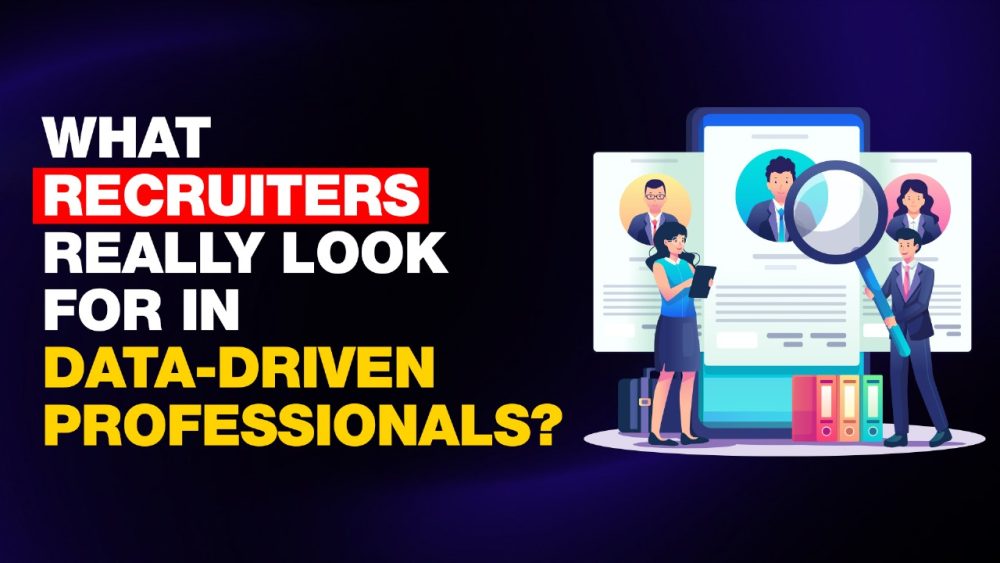Let’s cut right to it- being a Data Analyst isn’t just “in demand” anymore. It’s the most high-leverage skill set, bar none. You see, companies are done just collecting data. They need us to figure out what the heck it all means, and, more importantly, how to use it to solve a genuine, messy business problem. That’s the whole game.
This goes way beyond the basic technical stuff, by the way—your Excel, SQL, Tableau fluency. Recruiters are hunting for grit- critical thinking, serious problem-solving power, and the ability to explain complex ideas without rambling. The folks who can actually turn that dry chart into a concrete action plan? They’re the ones who drive the growth, and frankly, we fight to hire them.
So, forget the official job descriptions for a minute. When we’re interviewing for analysts, scientists, or BI roles, what are the traits that jump out? It’s about turning numbers into organizational results. Let’s break down the essential qualities.
Why You’re More Valuable Than Your Resume Says
The modern office is just a firehose of information—clicks, sales, supply chain metrics. It’s too much. But recruiters know this- the pro who can tame that chaos, interpret it, and apply it strategically gives the company an immediate, massive advantage.
Think about it like this- you’re not just a paper pusher if you can spot exactly why sales fell off a cliff last quarter, and then propose the specific plan to fix it. You just promoted yourself from “report generator” to problem-solver. That transition—linking the insight directly to the action—is why companies are spending serious money to find people like you.
1. The Analytical Engine- Asking Smart Questions
This is the starting line. You have to be a naturally analytical thinker. It isn’t about running formulas; it’s about deep-seated intellectual curiosity. You need to ask the right, intrusive questions, spot the subtle patterns, and come to conclusions that are totally undeniable.
We look for candidates who can-
- Take a huge, ugly business puzzle and, well, actually break it down into small, measurable, workable pieces. (That’s often the hardest part, honestly.)
- Spot a significant trend in a massive dataset without forgetting the core business goal.
- Hold themselves accountable- Does the data truly support this conclusion? You have to challenge your own findings.
Say, for instance, a company’s web traffic is soaring, but sales are flat. A great analyst doesn’t just report that—that’s easy. They’ll dig until they figure out the root cause- Is it terrible UX? Is the price wrong? Is something broken on the payment page? That’s the real skill.
2. The Required Kit- Technical Fluency
Okay, fine, skills matter. You need to know the standard tools. This is your foundation. We expect competency in-
- Excel- The universal constant. Still used everywhere for quick stuff.
- SQL– Absolutely non-negotiable for querying and wrangling data from any proper database.
- Python or R- The essential tools for sophisticated statistical modeling and serious automation work.
- Data Visualization- Tableau, Power BI, Data Studio. If you can’t show the data, it doesn’t exist.
You don’t need to be a guru in every tool, but versatility is huge. A portfolio that proves you’ve done actual, practical projects is the thing that makes us call you back.
3. Knowing the World- Business Context
This is a huge differentiator. You can be a genius at the technical stuff, but if you don’t understand the context—the why behind the numbers—your analysis is effectively useless. We prioritize candidates who grasp the commercial reality.
If you’re working in retail, knowing how a major holiday impacts sales is every bit as important as the model you built. In healthcare? Understanding patient privacy laws (HIPAA, and all that) isn’t a bonus; it’s mandatory. Blending technical skill with business sense is what makes you a true partner.
4. The Data Translator- Communication Power
If you can’t talk about your findings clearly, the data loses all its punch. Simple as that. We actively seek out people who can take complex numbers and translate them into a clear, actionable story for anyone—the engineers, the executives, literally anyone.
This talent includes-
- Building dashboards that are clean, focused, and only feature the truly important metrics.
- Writing reports that are concise—please, just get to the point—and explain the why without boring us to death.
- Using data storytelling to connect the analysis directly to a tangible business action. That’s the key.
Never say, “Conversion dropped by 12%.” Instead, say- “Conversion dropped by 12% because customers are quitting their carts right after we implemented the new shipping fee. We should launch an urgent free shipping test.” That clarity is what drives rapid decision-making.
5. The Investigator- Problem-Solving Drive
We do not want robots, people! We want creative, proactive thinkers. Every project needs to start with that hunger to dig deep.
A company might be facing huge customer churn, for example. A truly excellent analyst won’t just report the churn rate. They’ll go investigate call quality metrics, pricing structures, and feedback surveys to find the actual root cause. That proactive attitude—that’s a huge career booster.
6. The Good Citizen- Ethical Handling
Data privacy is a major concern these days. We need pros we can trust. That means-
- Treating data confidentiality with the respect it deserves.
- Understanding and following compliance requirements exactly.
- Actively working to prevent bias in your models and interpretations.
Ethical responsibility is right up there with your technical skills. We want people who guarantee their work is accurate, fair, and totally transparent.
7. The Adaptable Soul- Continuous Learning
The data world is moving fast. New tools, new techniques, always something new. We love candidates who show they are hungry to learn and can pivot quickly.
If you show us recent certifications, self-taught skills, or cool personal projects, it proves you’re serious about staying current. Learning the cloud platforms—AWS, Google BigQuery, all that—shows us you’re ready to evolve with the industry.
8. The Team Player- Collaboration
Data pros rarely work in a vacuum, right? You absolutely must be able to collaborate effectively with every department- marketing, finance, operations, IT.
The best example? The analyst who doesn’t just tell marketing their campaign failed. They partner with them to refine the targeting strategy, thereby directly boosting the ROI for the entire company. That cross-functional ability multiplies your professional value.
Our Interview Tactics- Seeing the Whole Picture
We can’t just trust a résumé; that’s too easy. We use a mix of tests to check these skills-
- Case Studies- A realistic business problem we ask you to analyze and solve.
- Practical Assessments- Hands-on tasks with data to test tool fluency under pressure.
- Behavioral Interviews- Targeted questions designed to see how you think and how you communicate your findings.
- Portfolio Review- We look at your actual dashboards, code, and project write-ups. (Don’t skip this step!)
This complete assessment gives us an honest view of what you can really deliver.
Your Plan to Get Hired
If you want a huge career in this field, here are your best moves-
- Build an Impact Portfolio- Your projects must show analysis, visualization, and the resulting business impact (e.g., “Saved $X by identifying Y inefficiency”).
- Master the Soft Skills- Practice simplifying data stories for non-technical audiences. Seriously, make it second nature.
- Be a Lifetime Learner- Take Data Analyst Course, attend webinars, and stay fluent with emerging tools. Don’t slow down!
- Quantify Your Wins- On your resume and in interviews, always use numbers to show how you fixed a problem, saved money, or increased efficiency.
- Champion Ethics- Be ready to talk about data privacy and how you ensure fairness in all your work.
Recruiters are hunting for the whole package- technical skill paired with analytical thought, sharp communication, business context, and integrity. Master that balance, and you will not only get hired—you’ll build an impressive, lasting career.



